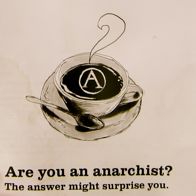-
 When I heard that the first-ever South African Anarchist Book Fair was being organized in Cape Town, I jumped at the opportunity to check it out. I had been to the anarchist book fair several times in Montreal, but never with a specific goal in mind. This time, I was going with a more tailored curiosity: How do anarchists go about organizing for social change? How do they see the relationship between means and ends? In their organizing efforts, to what extent do they hold the collective intention to become the change they seek?
When I heard that the first-ever South African Anarchist Book Fair was being organized in Cape Town, I jumped at the opportunity to check it out. I had been to the anarchist book fair several times in Montreal, but never with a specific goal in mind. This time, I was going with a more tailored curiosity: How do anarchists go about organizing for social change? How do they see the relationship between means and ends? In their organizing efforts, to what extent do they hold the collective intention to become the change they seek?As I poured over the anarchist primers with one hand, while skillfully devouring a delicious slice of vegan chocolate strawberry cake with the other, I found myself deeply resonating with a lot of what I was reading.
Not surprisingly, little attention was given to the idea of creating organizations to help further a social justice agenda. Anarchists seem to approach ‘organization’ as a verb not a noun. Their concern is that when we formalize our collaborative exchanges into what we call an organization, our social environment becomes increasingly calcified and thus less responsive to our ever-evolving needs as humans. And because organizations, by their very nature, are either working from the past or planning for the future, they greatly hamper our capacity to live fully in the moment. So in essence, the anarchist stance is that the best way for us to live out our vision for a just world is to unshackle ourselves as much as possible from the organizational contraptions we have created.
What most surprised me, though, was to come across two themes that we’ve devoted a lot of attention to through Organization Unbound. The first was “the experiential turn”:
Anarchists use democracy- but we don’t let democracy use us. For us, the first and last matter is always the needs and feelings of the individuals involved- any system to address them is provisional at best. We don’t try to force ourselves into the confines of any established procedures- we apply procedures to the extent that they serve human needs, and discard them past that point. …We don’t prize consensus, let alone The Rule of Law, above our own values and dreams…we see [them] as nothing more than the shadows of our predecessors’ customs, lengthened by the years to seem more wise than our own judgement. Seriously, what should come first- our systems, or us? (Fighting for our lives: An anarchist primer, CrimethInc.)
The second was “the giving field”:
What’s good for others is good for us, since our relationships with them make up the world in which we live; but serving their needs at our own expense would cheat them of our potential as free and happy companions, which is perhaps the best gift we can offer. Our vision of healthy relationships rests on the notion that self versus other, selfish versus selfless, is a false dichotomy, like all dichotomies. Those who preach self-sacrifice for the greater good are still working from the competitive model of individual-versus-society, as are those who would aspire to an individualist independence; for us, individuals and communities alike are both convergences of threads in the great web of existence, inseparable from one another, corresponding to one another. The freedom and self-determination we cherish are only possible in the context of the culture we create together; yet in order to contribute to that creation, we must create ourselves individually. That is: if you can save yourself, you could save the world, but you must save the world to save yourself. (Fighting for our lives: An anarchist primer, CrimethInc.)
I was hoping to come across more about ‘the how’ of anarchist organizing. If you know of any good reads, please share them!
A quick dip into anarchy



